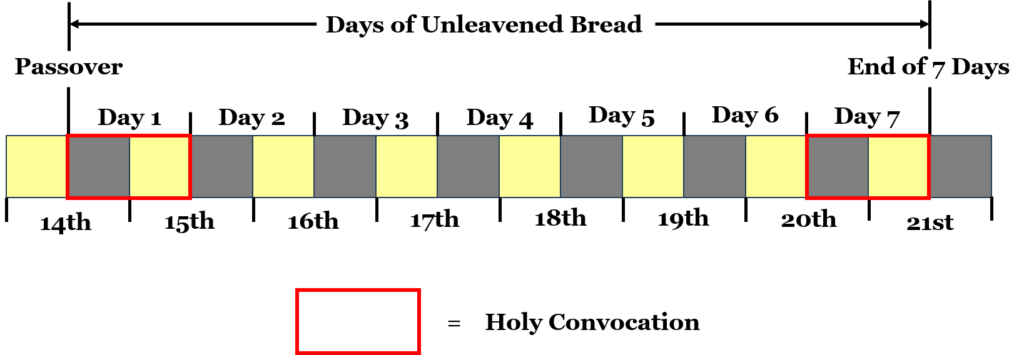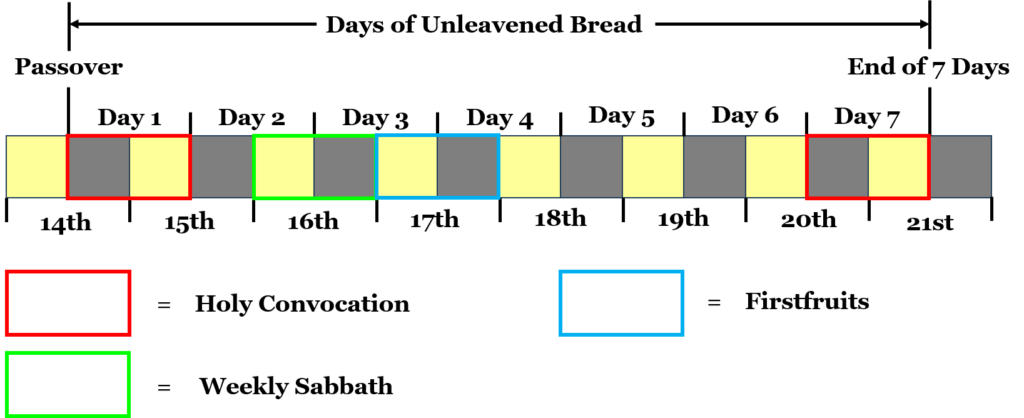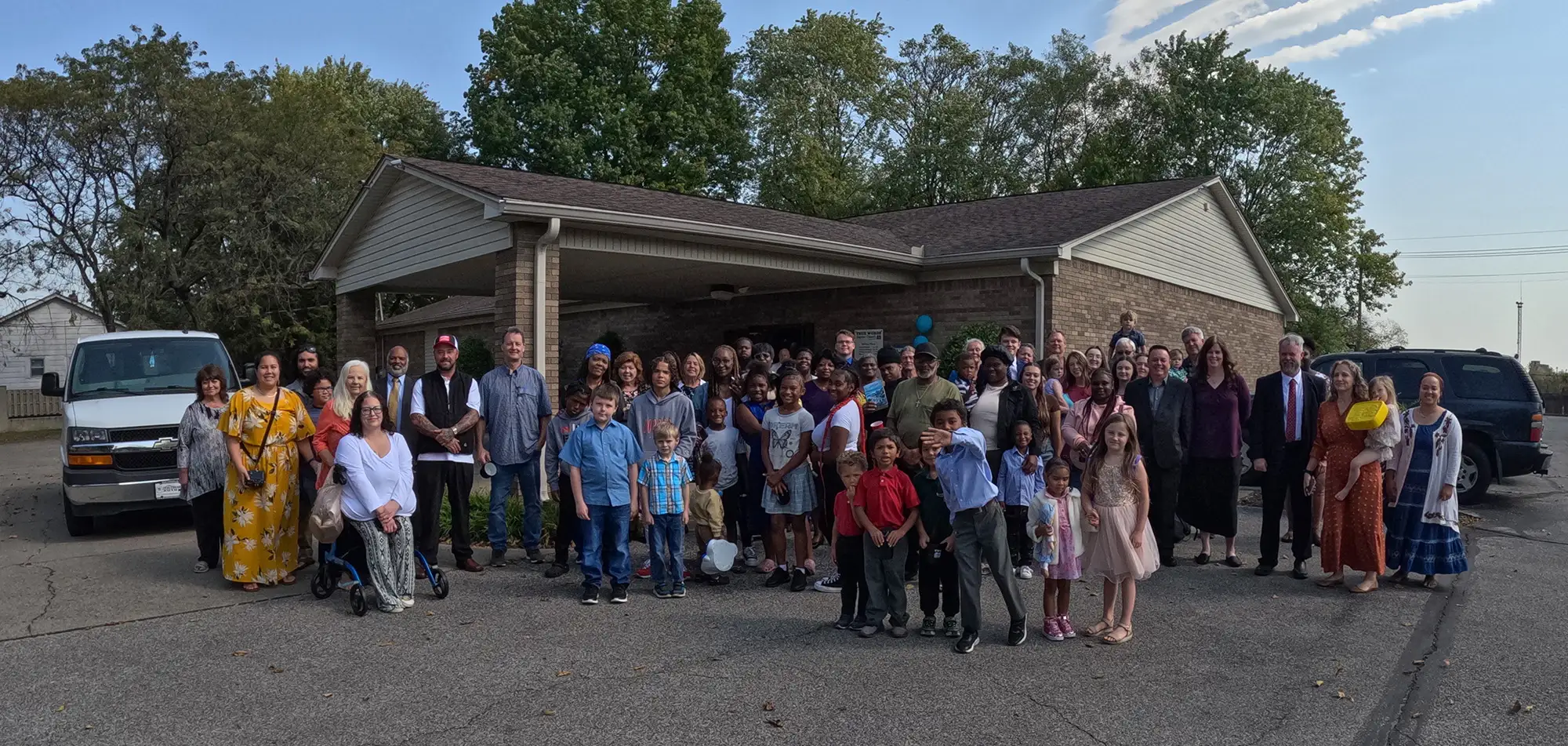Leviticus 23:1-14
Now that we know a day begins in the morning, it’s going to be much easier to understand the feasts of the Lord and their timing. In this Bible study, we’re going to just get a simple overview of the feasts of the Lord.
We just read Leviticus 23 showing the first three spring time feasts of the Lord. They all happen in the first month. A month is thirty days long according to the Bible. Leviticus Chapter 23 gives us all the feasts of the Lord.
The Weekly Sabbath Is Mentioned First
Within these feasts, as given in verse 3 of the chapter, is the weekly Sabbath day. We know that the weekly Sabbath begins on Saturday morning. Lasts all 12 hours of the day and all 12 hours of the night. When Sunday morning arrives, the weekly Sabbath is over.
Leviticus 23:3
Six days shall work be done: but the seventh day is the sabbath of rest, an holy convocation; ye shall do no work therein: it is the sabbath of the LORD in all your dwellings.
God puts that there, in His words, to let us know that the weekly Sabbath continues along with the feasts of the Lord.
Leviticus 23:4
These are the feasts of the LORD, even holy convocations, which ye shall proclaim in their seasons.
So, everything we see here in this chapter is speaking of the feasts of the Lord. For example, let’s see what the very first feast of the Lord happens to be.
Leviticus 23:5
In the fourteenth day of the first month at even is the LORD’S passover.
There’s the first feast. When does this feast begin? The Bible clearly says this feast begins in the 14th day of the first month at even. So, the 14th begins in the morning. When we get to the evening of the 14th, or when darkness arrives, the Passover feast begins.
The Passover is a Part of the 7 Days of Unleavened Bread
But I want you to see this. The Passover is actually a part of the feast of unleavened bread. That’s why the Bible is perfectly written in the order that it’s written here in Leviticus Chapter 23. This chapter ties the Passover and the feast of unleavened bread together.
Leviticus 23:5-8
In the fourteenth day of the first month at even is the LORD’S passover. 6 And on the fifteenth day of the same month is the feast of unleavened bread unto the LORD: seven days ye must eat unleavened bread. 7 In the first day ye shall have an holy convocation: ye shall do no servile work therein. 8 But ye shall offer an offering made by fire unto the LORD seven days: in the seventh day is an holy convocation: ye shall do no servile work therein.
Look, the Bible is tying the Passover and feast of unleavened bread together. The Passover is the beginning of the feast and the days of unleavened bread.
The Passover is the first feast beginning on the 14th of the month at evening. This feast doesn’t begin during the day time of the 14th. The Passover doesn’t begin until the evening comes on that 14th day of the first month.
When darkness arrives on the 14th, the Passover begins. When the next morning comes, that would be the 15th day of the first month. Verse6 right there says, “And on the fifteenth day of the same month is the feast of unleavened bread unto the Lord: seven days ye must eat unleavened bread.”
Evening of the 14th and Morning of the 15th are Closely Related
Now, notice, the Bible is tying the Passover together with the feast of unleavened bread. There is no clear separation of the seven days of unleavened bread within these Scriptures. The evening of the 14th and the morning of the 15th are being tied together here. They are very closely related.
The Bible clearly says right there in verse 7, “In the first day ye shall have an holy convocation: ye shall do no servile work therein.”
So, this is clearly a holy sabbath day unto the Lord. This isn’t the weekly Sabbath day. This is a special sabbath day as defined by the Lord God Almighty. So, the total feast time is seven days. “In the first day ye shall have an holy convocation.”
So, if we have seven days, as clearly defined by the Bible, when does that count begin? Does the count begin on the 14th day at even? Or does the count begin on the 15th day? Hey, listen, this is very important to getting things right in the Bible. If you get this wrong, your understanding of many other Scriptures will be wrong.
And when does that sabbath day or holy convocation begin? Is it on the 14th at even or does it begin on the 15th day in the next morning? The Bible clearly answers this question. We go back to the actual Passover. We go back to Exodus Chapter 12 and this chapter will tell us exactly when that 7-day count begins.
When Does the Seven Days of Unleavened Bread Begin?
Please watch and listen closely to the Scriptures here. This is where the Passover actually happened. This happened before Leviticus Chapter 23.
Exodus 12:13-14
And the blood shall be to you for a token upon the houses where ye are: and when I see the blood, I will pass over you, and the plague shall not be upon you to destroy you, when I smite the land of Egypt. 14 And this day shall be unto you for a memorial; and ye shall keep it a feast to the LORD throughout your generations; ye shall keep it a feast by an ordinance for ever.
Exodus 12:15-16
Seven days shall ye eat unleavened bread; even the first day ye shall put away leaven out of your houses: for whosoever eateth leavened bread from the first day until the seventh day, that soul shall be cut off from Israel. 16 And in the first day there shall be an holy convocation, and in the seventh day there shall be an holy convocation to you; no manner of work shall be done in them, save that which every man must eat, that only may be done of you.
Exodus 12:17-18
And ye shall observe the feast of unleavened bread; for in this selfsame day have I brought your armies out of the land of Egypt: therefore shall ye observe this day in your generations by an ordinance for ever. 18 In the first month, on the fourteenth day of the month at even, ye shall eat unleavened bread, until the one and twentieth day of the month at even.
There’s our answer to the question. When does the seven days of unleavened bread begin? Is it on the 14th at even when the Passover begins, or is it on the 15th day in the morning?
Verse 18 answers that question very clearly. The seven days of unleavened bread start on the 14th day of the month at even. That’s the exact timing of when the Passover begins. So, the Passover is the first day of unleavened bread and it starts in the evening.
From the 14th at Even to the 21st at Even
The timing of those 7 days of unleavened bread start on the 14th at even and they go to the 21st at even just as the Bible says directly in verse 18.
This is where people get the weekly Sabbath confused starting at night versus the Passover which actually begins in the evening. The weekly Sabbath never started in the evening. The Passover clearly begins on the 14th day of the first month at even. The 7 days of unleavened bread begin on the 14th day at even. And the count of 7 days is until the 21st day at even.

Now, that graphic right there is Biblical. This doesn’t break any of the Scriptures. If you attempt to say that every calendar begins at night, none of the Scriptures make any sense and the Scriptures would be broken. You would have say many different things such as the days of unleavened bread are eight days. That would break the Scriptures.
But we know the Scriptures can’t be broken. That right there is the only way that the Scriptures are not broken. And this is 100%, without a doubt, correct because the Bible says so.
We’re only going to see a couple of special days in the entire Bible in which the sabbath of those days or holy convocations begin at even or when the darkness arrives. The Passover is a night to remember. The weekly Sabbath day does not begin at night as we have proven in prior Bible studies. The Passover is one of those special days that begin at evening.
This Timing is Important To The Feast Days Which are Fulfilled by Jesus Christ
And, again, all of this is important because we are going to see these feasts in the New Testament. Jesus is our Passover, and He fulfills the Passover feast in the New Testament. When we understand the feasts, we can understand what’s happening in the four Gospels: Matthew, Mark, Luke, and John.
Remember, we’re going deeper into the Bible with this Thursday night Bible study.
So far, we see 2 feasts. The Passover and the Feast of unleavened bread. This is a combined feast that continues from the evening of the 14th into the day of the 15th. And that goes perfectly with the actual Passover occurrence in Exodus Chapter 12. I would love to stop here and go into those details, but I’m going to do that another time. I want to do a summary of the feasts of the Lord.
We also need to remember that the first day and the seventh day is a holy convocation and no servile work can be done. Leviticus 23 verses 7 and 8 says this. So let’s add that to the graphic.

There shall be no servile work on that first day and on that seventh day. Those days of the feasts, again, begin in the evening. From the 14th at even to the 15th at even, there will be no work done. From the 20th at even to the 21st at even, there will be no work done. Those two days are special Sabbath type days in which no work is done.
Now, please hear this. Jesus Christ, when He came to earth in the flesh, at His first coming, fulfilled these feasts. The Passover is fulfilled by the death of Jesus Christ. The feast of unleavened bread is fulfilled by the burial of Jesus Christ. So, we now need a feast for the resurrection of Jesus Christ. And that we’re going to see next.
The Firstfruits of Jesus Christ
Now, the next feast is also a feast that happens within these 7 days. You can look at that graphic again, and the third feast we’re going to see happens somewhere within those 7 days. Let’s see when the next feast of the Lord occurs.
Leviticus 23:9-11
And the LORD spake unto Moses, saying, 10 Speak unto the children of Israel, and say unto them, When ye be come into the land which I give unto you, and shall reap the harvest thereof, then ye shall bring a sheaf of the firstfruits of your harvest unto the priest: 11 And he shall wave the sheaf before the LORD, to be accepted for you: on the morrow after the sabbath the priest shall wave it.
Now, this is important. This is the feast of the firstfruits. Jesus Christ is the firstfruits. He arises from the dead in a new and incorruptible body. He’s first. We’ll get our new body later at our resurrection.
So, when does Jesus arise from the dead? Before we see this, take a close look at that verse right there, verse 11. “And he shall wave the sheaf before the Lord, to be accepted for you.” When? The perfect word of God says: “On the morrow after the sabbath the priest shall wave it.”
The Bible clearly says on the morrow after the sabbath. Now, watch this in Matthew Chapter 28 when Jesus arises from the dead.
Matthew 28:1
In the end of the sabbath, as it began to dawn toward the first day of the week, came Mary Magdalene and the other Mary to see the sepulchre.
This is resurrection day. It is the morrow after the sabbath. The weekly sabbath day is over. It’s dawning or the light from the sun is beginning to appear. The new day is here. Jesus is risen from the dead. That happens as the sun rises. Verse 6 in Matthew 28 says, “He is not here: for he is risen.”
Matthew 28:1 matches perfectly with the feast of the firstfruits in Leviticus 23. Remember, the Passover is a picture of the death of Jesus, the seven days of unleavened bread is a picture of the burial of Jesus, and the feast of firstfruits is a picture of the resurrection of Jesus Christ.
Where Does the Feast of Firstfruits Happen?
Jesus Christ has fulfilled these feasts that happen in the Spring or in the first month.
Now, where does this show up on that graphic?

Well, it depends on when the weekly Sabbath day occurs each year. If the weekly Sabbath occurred on the calendar day of the 16th, the Feast of Firstfruits would be the day after or the calendar day of the 17th. The feast of firstfruits can shift to the different days within that week.
Here’s where the feast of firstfruits would be if the weekly Sabbath was on the 16th day of the first month.

There are four more feasts of the Lord within Leviticus Chapter 23. We’ll continue with those next week, but I want to give a quick summary of those here. The timing of the next feast depends on the feast of firstfruits. Seven weekly sabbaths are seen and then the following day, 50 days from the firstfruits, is the next feast.
That feast is known as the Feast of Weeks because it is numbered seven weeks from the Firstfruits. The Feast of Weeks is also known as Pentecost and we see the fulfillment of that feast in Acts Chapter 2 at Pentecost that specific year.
The Feast of Weeks or the Feast of Pentecost
Hey, listen, the Bible is amazing and God reveals all of these mysteries to us. When all of this comes together perfectly, we can learn so much more from the Bible. And we begin to see that this is, 100% for sure, the perfect word of God.
The Feast of Weeks or Pentecost is the first harvest of the land. In Acts Chapter 2, we see the spiritual harvest of three thousand souls added to the church.
In the fall, we see three more feasts of the Lord from Leviticus Chapter 23. We’ll see the blowing of the trumpets on the first day of the seventh month. You’ll see the day of atonement on the tenth day of the seventh month. And then you’ll see the feast of tabernacles on the 15th day to the 22nd day of the seventh month.
Here’s the awesome part. We know the Passover, Feast of Unleavened Bread, Firstfruits, and Pentecost have all been fulfilled already. We know these final three feasts have not yet been fulfilled. The final three feasts, again, are the Blowing of the Trumpets or Feast of Trumpets, the Day of Atonement, and the Feast of Tabernacles.
We’re going to learn about all of these feasts in detail, how they are fulfilled, and more using the Scriptures.
We’ll start with a something similar to this study for those final four feasts next Bible study.
Let’s pray.

Leave a Reply